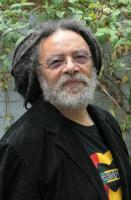 My talk will discuss the altered ecology of belonging that has emerged into Africa’s diasporas during the decades since “Black Atlantic” was published. My discussion of the problems that this has raised will centre on several key themes. They include the fortification of the overdeveloped countries, the impact of new communicative technologies on conceptions of solidarity, relationality and mutuality, the resurgence of extractive capitalism, and the export of generic racial identities from the USA to the whole world.
My talk will discuss the altered ecology of belonging that has emerged into Africa’s diasporas during the decades since “Black Atlantic” was published. My discussion of the problems that this has raised will centre on several key themes. They include the fortification of the overdeveloped countries, the impact of new communicative technologies on conceptions of solidarity, relationality and mutuality, the resurgence of extractive capitalism, and the export of generic racial identities from the USA to the whole world.
I'll visit
08.07.2019 | by vários
 Movement is at the core of life, not necessarily space. If it is translated into space, this is done by means of space being perceived as movement. Therefore, we are facing two completely opposing philosophies. From this point of view, the African movement philosophy, the pre-colonial one, is similar to a rationale specific to the digital world, according to which, fundamentally, one seeks to create connectivity, using networks, instead of tracing categories, classifying, establishing hierarchies and limiting movement.
Movement is at the core of life, not necessarily space. If it is translated into space, this is done by means of space being perceived as movement. Therefore, we are facing two completely opposing philosophies. From this point of view, the African movement philosophy, the pre-colonial one, is similar to a rationale specific to the digital world, according to which, fundamentally, one seeks to create connectivity, using networks, instead of tracing categories, classifying, establishing hierarchies and limiting movement.
Face to face
21.01.2019 | by António Guerreiro
 Cape Verde is not Africa, Cape Verdeans are “special blacks” and the closest to Portugal. Cape Verde is the country of miscegenation, the “proof” of “racial harmony” of Luso-Tropicalism. For many years, this was the dominant narrative. To be or not to be African continues to be a question.
Cape Verde is not Africa, Cape Verdeans are “special blacks” and the closest to Portugal. Cape Verde is the country of miscegenation, the “proof” of “racial harmony” of Luso-Tropicalism. For many years, this was the dominant narrative. To be or not to be African continues to be a question.
To read
04.12.2018 | by Joana Gorjão Henriques
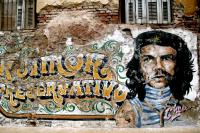 It’s Friday afternoon at the Al-Ahmad mosque in lower Buenos Aires. Despite gathering here with their multicultural brethren for prayer service, the small group of African men walking out the door is part of an inchoate community that has become a bit of a talking point in this vast and diverse metropolis.
It’s Friday afternoon at the Al-Ahmad mosque in lower Buenos Aires. Despite gathering here with their multicultural brethren for prayer service, the small group of African men walking out the door is part of an inchoate community that has become a bit of a talking point in this vast and diverse metropolis.
To read
08.06.2012 | by Pedro José-Marcellino aka P.J. Marcellino
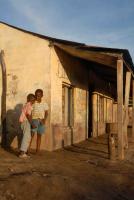 In your text, treat Africa as if it were one country. It is hot and dusty with rolling grasslands and huge herds of animals and tall, thin people who are starving. Or it is hot and steamy with very short people who eat primates. Don’t get bogged down with precise descriptions. Africa is big: fifty-four countries, 900 million people who are too busy starving and dying and warring and emigrating to read your book. The continent is full of deserts, jungles, highlands, savannahs and many other things, but your reader doesn’t care about all that, so keep your descriptions romantic and evocative and unparticular.
In your text, treat Africa as if it were one country. It is hot and dusty with rolling grasslands and huge herds of animals and tall, thin people who are starving. Or it is hot and steamy with very short people who eat primates. Don’t get bogged down with precise descriptions. Africa is big: fifty-four countries, 900 million people who are too busy starving and dying and warring and emigrating to read your book. The continent is full of deserts, jungles, highlands, savannahs and many other things, but your reader doesn’t care about all that, so keep your descriptions romantic and evocative and unparticular.
Mukanda
15.07.2011 | by Binyavanga Wainaina
 Although most of the moral economy theorists discussed so far are critics of historical capitalism, few of them are Marxists. Indeed, whether stressing market rationalism or communal norms, they refuse (often explicitly) to discuss peasant society in class terms (see especially Magagna, forthcoming). Marxist analyses of the peasantry, along with "peasant studies" in general may indeed be out of fashion (Roseberry 1989); nonetheless it is Marxists who continue to search for the cultural components of Third World responses to capitalism-- including witchcraft beliefs. The results may be problematic, but they nonetheless point to paths of inquiry not opened by the individualist and functionalist approaches of other moral economy theories.
Although most of the moral economy theorists discussed so far are critics of historical capitalism, few of them are Marxists. Indeed, whether stressing market rationalism or communal norms, they refuse (often explicitly) to discuss peasant society in class terms (see especially Magagna, forthcoming). Marxist analyses of the peasantry, along with "peasant studies" in general may indeed be out of fashion (Roseberry 1989); nonetheless it is Marxists who continue to search for the cultural components of Third World responses to capitalism-- including witchcraft beliefs. The results may be problematic, but they nonetheless point to paths of inquiry not opened by the individualist and functionalist approaches of other moral economy theories.
To read
11.07.2011 | by Ralph A. Austen
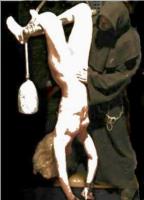 Witchcraft, as used here, is also an abstraction, but one intended to represent directly the terms used by African and other societies to describe their own beliefs and practices. The introductory section of the essay will attempt to identify an African witchcraft idiom which gives broader meaning to texts such as the Beninois oral account of slave-cowry transactions. The concluding section will examine the early-modern European "witch craze" in order to consider how the elaboration of common elements in European and African culture both reflects and mediates differing trajectories into the modern world
Witchcraft, as used here, is also an abstraction, but one intended to represent directly the terms used by African and other societies to describe their own beliefs and practices. The introductory section of the essay will attempt to identify an African witchcraft idiom which gives broader meaning to texts such as the Beninois oral account of slave-cowry transactions. The concluding section will examine the early-modern European "witch craze" in order to consider how the elaboration of common elements in European and African culture both reflects and mediates differing trajectories into the modern world
To read
19.06.2011 | by Ralph A. Austen
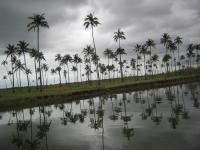 With the same boldness, but in very different conditions, a growing number of non-African youngsters adventure themselves in 21st century Africa. Refusing holiday packages where tourists are locked inside sterilized resorts, foreigners stroll around on their own improvised exploits, prepared with information of the networks and pocket guides. Rucksack on the back, they travel through countries that allow some daring. This way of travelling promotes meeting real people, and not only the crystalline waters or the exotic animals.
With the same boldness, but in very different conditions, a growing number of non-African youngsters adventure themselves in 21st century Africa. Refusing holiday packages where tourists are locked inside sterilized resorts, foreigners stroll around on their own improvised exploits, prepared with information of the networks and pocket guides. Rucksack on the back, they travel through countries that allow some daring. This way of travelling promotes meeting real people, and not only the crystalline waters or the exotic animals.
I'll visit
04.06.2011 | by Nuno Milagre
 Since the 1960s, there has been great excitement in many African countries with the creation of art schools. Together with the first exhibitions of self-taught artists, there have also been the first festivals of black art, and even the work of African photographers has begun to establish a reputation for itself in Africa, in European countries and in some forums in the USA. The history of these artistic movements is already being written, describing their schools, their leading figures and their international impact.
Since the 1960s, there has been great excitement in many African countries with the creation of art schools. Together with the first exhibitions of self-taught artists, there have also been the first festivals of black art, and even the work of African photographers has begun to establish a reputation for itself in Africa, in European countries and in some forums in the USA. The history of these artistic movements is already being written, describing their schools, their leading figures and their international impact.
To read
11.05.2011 | by António Pinto Ribeiro
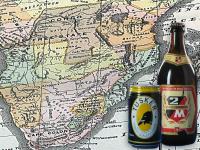 We decided to stick around for a beer at the end of a shooting day for the movie “The Hero” directed by Zezé Gamboa. We were on the Island of Luanda, where we had filmed from two in the afternoon to one in the morning. We stopped the car next to a stand, leaving the door open to keep listening to the pirated cassette playing on the car radio. In the group, the Angolans drink imported beer, Super Bock; the foreigners drink national beer, Cuca, each one savouring the exotic freshness of its own point of view while we talk in the shadow of a tranquil weekday dawn.
We decided to stick around for a beer at the end of a shooting day for the movie “The Hero” directed by Zezé Gamboa. We were on the Island of Luanda, where we had filmed from two in the afternoon to one in the morning. We stopped the car next to a stand, leaving the door open to keep listening to the pirated cassette playing on the car radio. In the group, the Angolans drink imported beer, Super Bock; the foreigners drink national beer, Cuca, each one savouring the exotic freshness of its own point of view while we talk in the shadow of a tranquil weekday dawn.
I'll visit
03.04.2011 | by Nuno Milagre
 Africa is portrayed as an over-determined image. In other words, a place capable of shaping the abundance of circulating discourses, the terms and labels for the continent and the situations of traumatic nature. The widespread geography that characterises Africa both internal and externally, the continent remains a space of ambivalence that still polarizes fundamental issues as human rights, racial equality, apartheid, subordination, hybridization, mixing, the displacement of people and cultures.
Africa is portrayed as an over-determined image. In other words, a place capable of shaping the abundance of circulating discourses, the terms and labels for the continent and the situations of traumatic nature. The widespread geography that characterises Africa both internal and externally, the continent remains a space of ambivalence that still polarizes fundamental issues as human rights, racial equality, apartheid, subordination, hybridization, mixing, the displacement of people and cultures.
I'll visit
23.05.2010 | by Marta Mestre
 My talk will discuss the altered ecology of belonging that has emerged into Africa’s diasporas during the decades since “Black Atlantic” was published. My discussion of the problems that this has raised will centre on several key themes. They include the fortification of the overdeveloped countries, the impact of new communicative technologies on conceptions of solidarity, relationality and mutuality, the resurgence of extractive capitalism, and the export of generic racial identities from the USA to the whole world.
My talk will discuss the altered ecology of belonging that has emerged into Africa’s diasporas during the decades since “Black Atlantic” was published. My discussion of the problems that this has raised will centre on several key themes. They include the fortification of the overdeveloped countries, the impact of new communicative technologies on conceptions of solidarity, relationality and mutuality, the resurgence of extractive capitalism, and the export of generic racial identities from the USA to the whole world.  Movement is at the core of life, not necessarily space. If it is translated into space, this is done by means of space being perceived as movement. Therefore, we are facing two completely opposing philosophies. From this point of view, the African movement philosophy, the pre-colonial one, is similar to a rationale specific to the digital world, according to which, fundamentally, one seeks to create connectivity, using networks, instead of tracing categories, classifying, establishing hierarchies and limiting movement.
Movement is at the core of life, not necessarily space. If it is translated into space, this is done by means of space being perceived as movement. Therefore, we are facing two completely opposing philosophies. From this point of view, the African movement philosophy, the pre-colonial one, is similar to a rationale specific to the digital world, according to which, fundamentally, one seeks to create connectivity, using networks, instead of tracing categories, classifying, establishing hierarchies and limiting movement.  Cape Verde is not Africa, Cape Verdeans are “special blacks” and the closest to Portugal. Cape Verde is the country of miscegenation, the “proof” of “racial harmony” of Luso-Tropicalism. For many years, this was the dominant narrative. To be or not to be African continues to be a question.
Cape Verde is not Africa, Cape Verdeans are “special blacks” and the closest to Portugal. Cape Verde is the country of miscegenation, the “proof” of “racial harmony” of Luso-Tropicalism. For many years, this was the dominant narrative. To be or not to be African continues to be a question.  It’s Friday afternoon at the Al-Ahmad mosque in lower Buenos Aires. Despite gathering here with their multicultural brethren for prayer service, the small group of African men walking out the door is part of an inchoate community that has become a bit of a talking point in this vast and diverse metropolis.
It’s Friday afternoon at the Al-Ahmad mosque in lower Buenos Aires. Despite gathering here with their multicultural brethren for prayer service, the small group of African men walking out the door is part of an inchoate community that has become a bit of a talking point in this vast and diverse metropolis.  In your text, treat Africa as if it were one country. It is hot and dusty with rolling grasslands and huge herds of animals and tall, thin people who are starving. Or it is hot and steamy with very short people who eat primates. Don’t get bogged down with precise descriptions. Africa is big: fifty-four countries, 900 million people who are too busy starving and dying and warring and emigrating to read your book. The continent is full of deserts, jungles, highlands, savannahs and many other things, but your reader doesn’t care about all that, so keep your descriptions romantic and evocative and unparticular.
In your text, treat Africa as if it were one country. It is hot and dusty with rolling grasslands and huge herds of animals and tall, thin people who are starving. Or it is hot and steamy with very short people who eat primates. Don’t get bogged down with precise descriptions. Africa is big: fifty-four countries, 900 million people who are too busy starving and dying and warring and emigrating to read your book. The continent is full of deserts, jungles, highlands, savannahs and many other things, but your reader doesn’t care about all that, so keep your descriptions romantic and evocative and unparticular.  Although most of the moral economy theorists discussed so far are critics of historical capitalism, few of them are Marxists. Indeed, whether stressing market rationalism or communal norms, they refuse (often explicitly) to discuss peasant society in class terms (see especially Magagna, forthcoming). Marxist analyses of the peasantry, along with "peasant studies" in general may indeed be out of fashion (Roseberry 1989); nonetheless it is Marxists who continue to search for the cultural components of Third World responses to capitalism-- including witchcraft beliefs. The results may be problematic, but they nonetheless point to paths of inquiry not opened by the individualist and functionalist approaches of other moral economy theories.
Although most of the moral economy theorists discussed so far are critics of historical capitalism, few of them are Marxists. Indeed, whether stressing market rationalism or communal norms, they refuse (often explicitly) to discuss peasant society in class terms (see especially Magagna, forthcoming). Marxist analyses of the peasantry, along with "peasant studies" in general may indeed be out of fashion (Roseberry 1989); nonetheless it is Marxists who continue to search for the cultural components of Third World responses to capitalism-- including witchcraft beliefs. The results may be problematic, but they nonetheless point to paths of inquiry not opened by the individualist and functionalist approaches of other moral economy theories.  Witchcraft, as used here, is also an abstraction, but one intended to represent directly the terms used by African and other societies to describe their own beliefs and practices. The introductory section of the essay will attempt to identify an African witchcraft idiom which gives broader meaning to texts such as the Beninois oral account of slave-cowry transactions. The concluding section will examine the early-modern European "witch craze" in order to consider how the elaboration of common elements in European and African culture both reflects and mediates differing trajectories into the modern world
Witchcraft, as used here, is also an abstraction, but one intended to represent directly the terms used by African and other societies to describe their own beliefs and practices. The introductory section of the essay will attempt to identify an African witchcraft idiom which gives broader meaning to texts such as the Beninois oral account of slave-cowry transactions. The concluding section will examine the early-modern European "witch craze" in order to consider how the elaboration of common elements in European and African culture both reflects and mediates differing trajectories into the modern world  With the same boldness, but in very different conditions, a growing number of non-African youngsters adventure themselves in 21st century Africa. Refusing holiday packages where tourists are locked inside sterilized resorts, foreigners stroll around on their own improvised exploits, prepared with information of the networks and pocket guides. Rucksack on the back, they travel through countries that allow some daring. This way of travelling promotes meeting real people, and not only the crystalline waters or the exotic animals.
With the same boldness, but in very different conditions, a growing number of non-African youngsters adventure themselves in 21st century Africa. Refusing holiday packages where tourists are locked inside sterilized resorts, foreigners stroll around on their own improvised exploits, prepared with information of the networks and pocket guides. Rucksack on the back, they travel through countries that allow some daring. This way of travelling promotes meeting real people, and not only the crystalline waters or the exotic animals.  Since the 1960s, there has been great excitement in many African countries with the creation of art schools. Together with the first exhibitions of self-taught artists, there have also been the first festivals of black art, and even the work of African photographers has begun to establish a reputation for itself in Africa, in European countries and in some forums in the USA. The history of these artistic movements is already being written, describing their schools, their leading figures and their international impact.
Since the 1960s, there has been great excitement in many African countries with the creation of art schools. Together with the first exhibitions of self-taught artists, there have also been the first festivals of black art, and even the work of African photographers has begun to establish a reputation for itself in Africa, in European countries and in some forums in the USA. The history of these artistic movements is already being written, describing their schools, their leading figures and their international impact.  We decided to stick around for a beer at the end of a shooting day for the movie “The Hero” directed by Zezé Gamboa. We were on the Island of Luanda, where we had filmed from two in the afternoon to one in the morning. We stopped the car next to a stand, leaving the door open to keep listening to the pirated cassette playing on the car radio. In the group, the Angolans drink imported beer, Super Bock; the foreigners drink national beer, Cuca, each one savouring the exotic freshness of its own point of view while we talk in the shadow of a tranquil weekday dawn.
We decided to stick around for a beer at the end of a shooting day for the movie “The Hero” directed by Zezé Gamboa. We were on the Island of Luanda, where we had filmed from two in the afternoon to one in the morning. We stopped the car next to a stand, leaving the door open to keep listening to the pirated cassette playing on the car radio. In the group, the Angolans drink imported beer, Super Bock; the foreigners drink national beer, Cuca, each one savouring the exotic freshness of its own point of view while we talk in the shadow of a tranquil weekday dawn.  Africa is portrayed as an over-determined image. In other words, a place capable of shaping the abundance of circulating discourses, the terms and labels for the continent and the situations of traumatic nature. The widespread geography that characterises Africa both internal and externally, the continent remains a space of ambivalence that still polarizes fundamental issues as human rights, racial equality, apartheid, subordination, hybridization, mixing, the displacement of people and cultures.
Africa is portrayed as an over-determined image. In other words, a place capable of shaping the abundance of circulating discourses, the terms and labels for the continent and the situations of traumatic nature. The widespread geography that characterises Africa both internal and externally, the continent remains a space of ambivalence that still polarizes fundamental issues as human rights, racial equality, apartheid, subordination, hybridization, mixing, the displacement of people and cultures. 